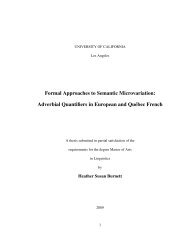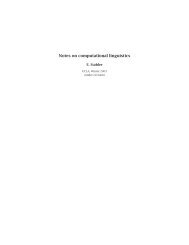miya-english-hausa dictionary - UCLA Department of Linguistics
miya-english-hausa dictionary - UCLA Department of Linguistics
miya-english-hausa dictionary - UCLA Department of Linguistics
You also want an ePaper? Increase the reach of your titles
YUMPU automatically turns print PDFs into web optimized ePapers that Google loves.
Appendices 55<br />
Verbal TAM’s Nominal TAM’s<br />
Imperative (5:§2.1.1) Imperfective with Totality s-…-y (5:§2.2.3.5)<br />
Perfective (5:§2.1.3) Subjunctive (5:§2.2.2)<br />
Hortative (5:§2.1.3) Perfective with focused subject (5:§2.2.1)<br />
Negative Imperative/Horative/Subjunctive (5:§3.3)<br />
The only important TAM forms which are not included are the Counterfactual<br />
(5:§2.1.4) and the Conditional Future (5:§2.2.5), for which I do not have full paradigms.<br />
The negative Perfective (5:§3.1) is identical to the Perfective with m (COMPLEMENTS)<br />
-w following the verb. Negative Imperfective (5:§3.4) is identical to the Imperfective<br />
illustrated here, but with the discontinuous negative m-…-w replacing the s-…-y<br />
Totality.<br />
VERBAL TAMS<br />
TAM Verb Class Ø object IO pronoun DO pronoun ICP<br />
Imperative<br />
• singular<br />
• 2 plural<br />
• 1 plural<br />
L Ca<br />
H Ca<br />
L CVCa<br />
L CVC<br />
L CVC”<br />
H H CVCa<br />
(continued on next page)<br />
tshiy ‘give’<br />
ts<br />
tsy<br />
tsym<br />
kwhy ‘lack’<br />
kwy4 kwyy<br />
kwymy<br />
tkak”<br />
‘accompany’<br />
tka<br />
tky<br />
tkiym<br />
zrak” ‘call’<br />
zr<br />
zry<br />
zriym<br />
bsak” ‘wash’<br />
bs”<br />
bsy<br />
bsiym<br />
btak ‘untie’<br />
bta<br />
bty<br />
btiym<br />
ts-y<br />
tsy-y<br />
tsym-y<br />
? 5<br />
tka-y<br />
tkiy-y<br />
tkiym-y<br />
zra-y<br />
zriy-y<br />
zriym-y<br />
bsa-y<br />
bsiy-y<br />
bsiym-y<br />
bta-y<br />
btiy-y<br />
btiym-y<br />
ts-ya<br />
tsy-y<br />
tsym-y<br />
kw-y<br />
kwy-y<br />
kwym-y<br />
tka-ya<br />
tkiy-ya<br />
tkiym-y<br />
zr-ya<br />
zriy-ya<br />
zriym-y<br />
bs”-ya<br />
bsiy-ya<br />
bsiym-y<br />
bta-y<br />
btiy-y<br />
btiym-y<br />
zhiy ‘enter’<br />
z-ku<br />
zy-ka<br />
zy-m<br />
tlhy ‘stand up’<br />
tl-k<br />
tly-k<br />
tly-m<br />
tsgak” ‘sit down’<br />
tsga-ku<br />
tsgiy-ka<br />
tsgiy-m<br />
bwak” ‘go out’<br />
bo-ku<br />
bwiy-ka<br />
bwiy-m<br />
bsak” ‘bathe’<br />
bs”-ku<br />
bsiy-ka<br />
bsiy-m<br />
ghdzak ‘turn’<br />
ghdza-k<br />
ghdziy-k<br />
ghdziy-m<br />
4 The Ø object forms <strong>of</strong> this verb include the Totality suffix -a;y (7:§2). Vaziya would not give this verb in<br />
the affirmative Imperative without this suffix.<br />
5 Kwa; ‘lack’ was the only transitive H class monoconsonantal verb I found. Vaziya could make no sense<br />
<strong>of</strong> this verb with an Indirect Object.

















